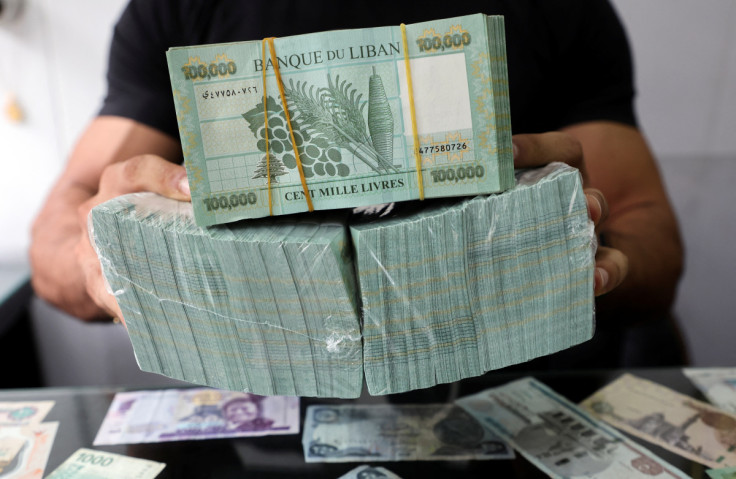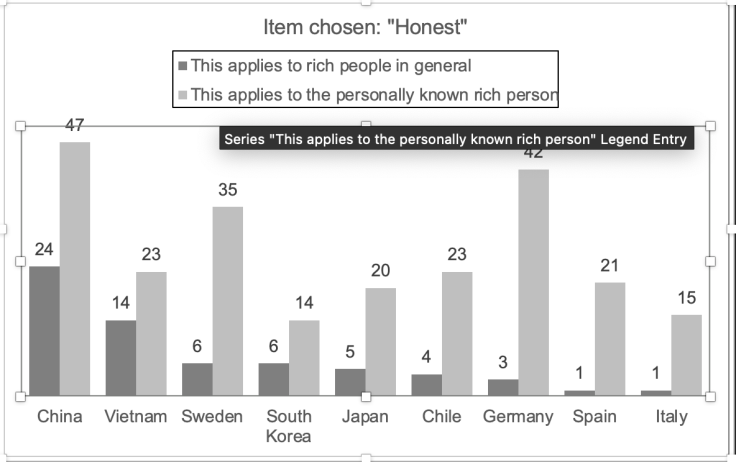Are rich people dishonest? What does it even mean to be honest?
In all of the surveyed countries, the characteristic least often associated with rich people was "honest."

Do you think rich people are honest? If you answer "no," you are far from alone. I commissioned the renowned institute Ipsos MORI to conduct a survey on the image of rich people in different countries. One of the questions asked people what personality traits they would attribute to the rich. Respondents had a choice of seven positive and seven negative personality traits: intelligent, self-centred, industrious, greedy, honest, materialistic, arrogant, imaginative, optimistic, ruthless, superficial, bold/daring, cold-hearted, and visionary/far-sighted.
In all of the surveyed countries, the characteristic least often associated with rich people was "honest." The survey included another question in which we asked whether respondents personally knew one or more millionaires. Respondents who answered in the affirmative were presented with the same list of personality traits and asked which they would attribute to the millionaire they know best.
The discrepancy was clear in all countries: In Germany, for example, only 3 per cent of respondents said that rich people, in general, were "honest." If you ask the people who know one or more millionaires personally whether the millionaire they know best is honest, the figure rises to 42 per cent. A similar pattern emerged in other countries, as this graph shows:

Are rich people honest?
Why do so many people believe that rich people are dishonest? It is because of "zero-sum beliefs." This is the view that the rich are only rich because they have taken something from the poor. Bertolt Brecht concisely expressed this attitude in his 1934 poem "Alfabet," in which two men – one rich, one poor – come face to face: "Said the poor man with a twitch: Were I not poor, you wouldn't be rich."
I suspect that a majority of prison inmates are adherents of zero-sum beliefs. They believed they could only get rich by robbing a bank, breaking into someone's home or cheating someone. But many intellectuals also imagine economic life as a zero-sum game. Accordingly, rich countries should give some of their wealth to poor countries, and rich people should give aid to the poor. From this point of view, it is only because the rich are so selfish and mean-spirited that so many people are still poor.
Indeed, in earlier societies, wealth was often based on theft and a small number of people enriched themselves at the expense of others. The market system, on the other hand, works completely differently. It is based on getting rich by satisfying the needs of as many consumers as possible. That is the logic of the market.
The number of billionaires has increased about sixfold over the past 25 years while the number of poor people around the world has decreased more rapidly than ever before in human history. The reason for both developments is the same: The spread of capitalism and the economic growth it creates.
If you take a look at the list of the richest people in the world, you will see that none of them became rich by taking something away from others, but because, as entrepreneurs, they have made a huge and beneficial contribution to society as a whole.
Of course, history has had its share of rich liars and fraudsters. Bernhard "Bernie" Madoff managed to steal over $60 billion from investors and was sentenced to 150 years in prison for his crimes. The list of people who got rich by cheating and taking advantage of others is long. But do you really believe that there are more criminals in gated communities than in social hotspots? Honest and dishonest people exist in all social classes and income groups.
Most rich people have become rich as a result of great entrepreneurial ideas. The company WhatsApp was founded in 2009 in Santa Clara, California, by Jan Koum and Brian Acton. The two founders, who later sold WhatsApp to Facebook, have a combined fortune of about $18 billion.
Their creation allows two billion people around the world not only to write free text messages but also to make free phone calls. Jan Koum and Brian Acton did not become rich because they took something away from others, but because they gave something to people.
The same goes for entrepreneurs such as Bill Gates (Microsoft), Larry Ellison (Oracle), Jeff Larry Page and Sergey Brin (Google) and hundreds of thousands of other entrepreneurs who became rich through good ideas – and not through dishonesty or because they took something away from the poor.
One last thing: Anyone who clings to zero-sum beliefs, or is convinced that they can only become rich by lying and cheating, will either become a criminal (if they are dishonest) or block their own financial success (if they are honest).

Rainer Zitelmann is a historian, sociologist and multiple bestselling author, whose books include “In Defence of Capitalism” https://in-defence-of-capitalism.com/ and “Hitler’s National Socialism” https://hitlers-national-socialism.com/ among 26 other published books. His books have been translated into 30 languages around the world. In recent years, he has written articles and been the subject of interviews in leading media such as Forbes, Newsweek, The Daily Telegraph, The Times, Le Monde, Corriere della Sera, Frankfurter Allgemeine Zeitung, Neue Zürcher Zeitung, and numerous media in Latin America and Asia.
© Copyright IBTimes 2025. All rights reserved.




















